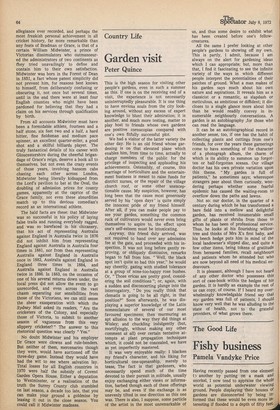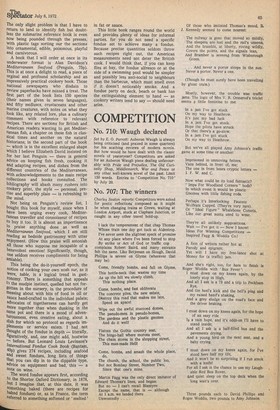The Good Life
Fishy business
Pamela Vandyke Price
Having recently passed from one element t) another by putting on a mask and snorkel, I now tend to appraise the whole world as potential underwater viewing ground. People displaying their houses er gardens are disconcerted by being informed that these would be even more interesting if flooded to a depth of fifty feetA The only slight problem is that I have to return to land to identify fish but doubtless the submarine reference book is even now being pounded through the presses, With plastic tags sorting our the sections into ornamental, edible, poisonous, playful and carnivorous.
A book that I will order at once in its underwater format is Alan Davidson's Mediterranean Seafood (Penguin, '75p). This is at once a delight to read, a piece of orginal and profound scholarship and an impressively practical cookery book. Those national newspapers who disdain to review paperbacks have missed a treat. The first part of the book lists 150 species (their names given in seven languages), and fifty molluscs, crustaceans and other marine creatures, with notes on what they look like, any related lore, plus a culinary comment with reference to relevant recipes. There are sections for British and American readers wanting to get Mediterranean fish, a chapter on these fish in clas sical times and another on 'the natural historians; in the second part of the book which is in the excellent enlarged shape Which I believe Elizabeth David insisted on for her last Penguin — there is general advice on keeping fish fresh, cooking it and adapting recipes, and dishes from the different countries of the Mediterranean, With acknowledgements to the main recipe collections and books consulted. The bibliography will abash many rushers into cookery print, the style — personal, precise and superbly plain — is refreshing to the mind.
Not being on Penguin's review list, I bought this book for myself, since when I have been urging every cook, Mediter ranean traveller and connoisseur of recipes to buy it too. It is almost an impertinence to praise anything done as well as Mediterranean Seafood, which I am still reading as bedside gastronomy with utter enjoyment. (How this praise will astonish all those who suppose me incapable of a benevolent emotion! Significantly, though, one seldom receives compliments for being amiable).
This being the do-it-yourself epoch, the notion of cooking your own nosh sur, as it Were, table, is a logical trend in gastronomy. There is something that appeals to the mudpie instinct, quelled but not forgotten in the nursery, in the procedure of Messing about with bits of food in oil or sauce hand-crafted to the individual palate; advocates of togetherness can hardly get More together than when dunking in the same pot and there is a mood of adven turousness, even creative eating, about a dish for which no protocol as regards im plements or service exists. I had not thought of the fondue in depth — literally, figuratively, and, one might add, hostwise ”— before. But Leonard Louis Levinson's International Fondue Cook Book (Bantam, 40p) gives 274 recipes, including seafood and sweet fondues, long lists of things that you can dip in to the dippable type, advice on equipment and bad, this — a note on wine.
The word fondue appears first, according to the Shorter Oxford Dictionary, in 1878, but I imagine that, at this date, it was something baked (there are recipes for baked fondues) or, as in France, the term referred to something softened or 'melted ' This little book ranges round the world and provides plenty of ideas for informal parties, for you do not need a specific fondue set to achieve many a fondue. Because precise quantities seldom throw such recipes right out, the American measurements need not deter the British cook. I would think that, if you can keep flies at bay, the fondue alfresco or at the side of a swimming pool would be simpler and possibly less anti-social to neighbours than the barbecue, which must smell even if it doesn't noticeably smoke. And a fondue party on deck, beach or bank has the extinguishing element to hand — as cookery writers tend to say — should need arise. in fat or sauce.











































 Previous page
Previous page